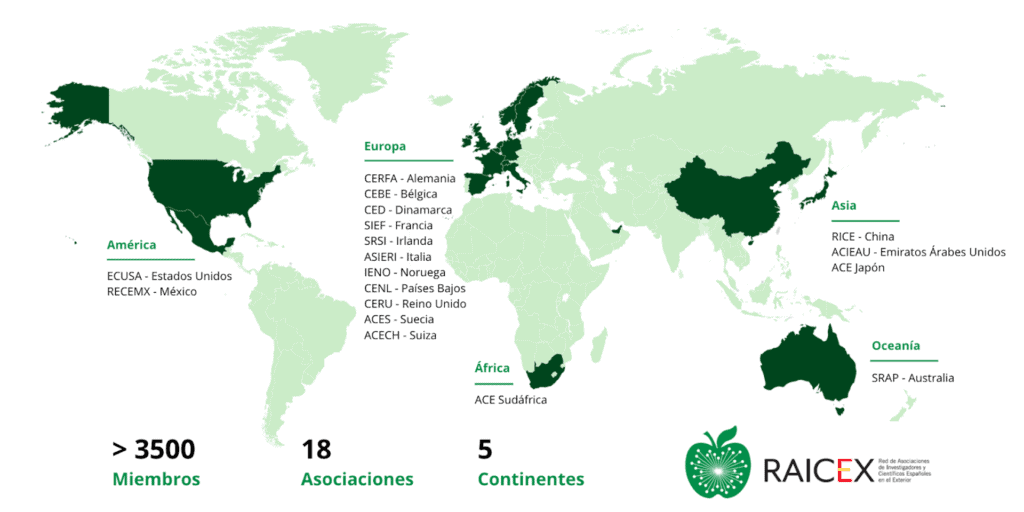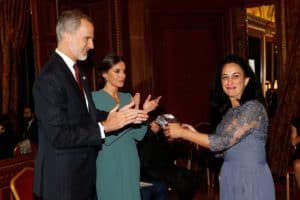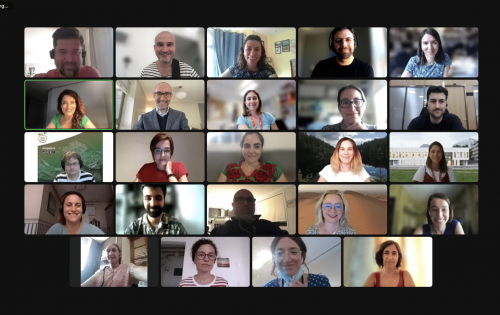
What is RAICEX?
RAICEX is the Network of Associations of Spanish Researchers and Scientists Abroad, which currently brings together 18 associations spread over five continents and has more than 4,000 members. RAICEX brings together Spanish scientists and researchers abroad in a common forum and promotes the exchange of experiences and knowledge with all the agents of the Spanish Science, Technology, and Innovation System. In essence, RAICEX serves as an advisory body, source of information, and catalyst of international and multidirectional relations in scientific matters that contributes to the progress of science. Together, we are RAICEX #LaUniónHaceLaCiencia.

SRUK/CERU participation in RAICEX
Organisation, events, and outreach
Since RAICEX was founded in 2018, SRUK/CERU has been an active collaborator of the network. Below, you can find a summary of SRUK/CERU contributions:
- Since December 2021, SRUK/CERU has been part of the current team of directors in RAICEX, with Carmen Sánchez Cañizares as the vicepresident.
- In 2021, the VI meeting of Spanish science, technology and innovation diplomacy and RAICEX took place in Madrid. You can check the general summary of the event and how SRUK/CERU contributed.
- In 2020, Mercedes Maroto, applicant proposed by SRUK/CERU, received the ACES-Margarita Salas award in Stockholm. You can find out more details related this award and the ceremony event for its first edition and the awardee.
- In 2019, the V Conference on Scientific Diplomacy took place in Madrid. You can check the general summary of the event and how SRUK/CERU contributed.
- During the academic year 2018-19, SRUK/CERU held the presidency of RAICEX in the course of its foundation with Javier Escudero.


Science Policy
Through the SRUK/CERU Science Policy Department and other groups created ad hoc, SRUK/CERU has participated in the preparation of the following reports and publications:
[2023-24]
- Proposals for the public consultation by ANECA on the general criteria for state accreditation in the Spanish university system. You can find RAICEX’s proposals via this link (February 2024).
- “La voz de una diáspora organizada”. Article published in El País in January 2024.
- Proposals for the public consultation by ANECA on the evaluation criteria for research activity (six-year periods of research). You can find RAICEX’s proposals via this link (November 2023).
- Proposals for the public consultation phase of the Royal Decree regulating the statute of Spanish citizenship abroad. You can read the proposal sent by RAICEX to the Ministry of Inclusion, Social Security, and Migration (October 2023).
[2022-23]
- Decalogue to improve the internationalization of the Spanish System of Science, Technology, and Innovation ahead of the general elections in July 23 in Spain. You can find it via this link (July 2023).
- Proposals for the public consultation phase of the Royal Decree regulating state accreditation in the Spanish university system. You can read the proposal sent by RAICEX to the Ministry of Universities (June 2023)
- Proposals for the prior public consultation of the Royal Decree regulating state accreditation in the Spanish university system. You can read the proposal sent by RAICEX to the Ministry of Universities (May 2023)
- Proposal for amendments to the Preliminary Draft Law of the University System (LOSU). You can read the proposal sent by RAICEX to the Ministry and parliamentary groups (September 2022).
[2021-22]
- “Reforma de la Ley de la Ciencia”. Opinion article published in SEBBM in September 2022.
- “The story of RAICEX as a successful scientific diaspora organization”. Article published in Frontiers in July 2022.
- RAICEX contribution for the public consultation for the modification of the Law of Science, Technology and Innovation. You can read the proposal sent by RAICEX.
- “Hacia un sistema de ciencia e innovación competitivo y atractivo a escala internacional”. Article published in El País in March 2022.
[2020-21]
- “ATRAE” (Attraction of Talent and Return to Spain) report. This document is a decalogue of proposals to facilitate the return of Spanish researchers from abroad. The report arises as a complementary action to the “Return to Spain Plan” approved in 2019. You can read the Decalogue and the corresponding report.
[2019-20]
- Report on “Patronage Laws and Academy-Industry collaborations Presented”, published in November 2019. You can read the report.
- Report on the “Tenure Track” for the Ministry of Science and Innovation.
(*)RAICEX hosts an archive of most of these reports and publications (see also this page)
Women in Science
The SRUK/CERU WOM=N and SCIENCE Committee has also actively participated in the different initiatives carried out by the Research and Gender Committee (IgR) of RAICEX, where the main objective is to increase the awareness about the gender gap in the labour structure based on research and science. Among the projects this committee have been involved in, it is worth highlighting the following:
- In September 2021, the committee participated in the 11th European congress of “Gender Equality in Higher Education” (GEHE). They presented a poster showing an analysis of the gender gaps in academia carried out across 7 countries, including the United Kingdom, together with the policies that each country had implemented to tackle inequality. The most relevant results are summarised in this YouTube video.
- Due to the excellent reception that this project has had, RAICEX has expanded the scope of the project. Up to a total of 12 associations established in countries across the globe, including SRUK/CERU, have come together to write a White Book on International Gender Equality Policies in Science that evaluates and reflects on these issues from multiple perspectives. The White Book is expected to be published at the end of 2022.
How can you collaborate with RAICEX?
If you are a member of SRUK/CERU, you can become more involved in RAICEX as a member of this network by:
- Registering to receive the monthly RAICEX newsletter.
- Disseminating and giving visibility to your research through (1) the monthly RAICEX radio program Punto de Enlace available on Radio Exterior and led by our SRUK/CERU Ambassador Eduardo Oliver and Eva Ortega Paíno or (2) by written interviews. If you are keen on participating in this initiative, please fill out this form so the team can get in contact with you.
- Joining the RAICEX commissions on Science Policy, Gender Equality, or Communication as a volunteer. If this sounds like the projects you would be keen on participating, please send an email to [email protected], [email protected], or [email protected].
- Joining the RAICEX Telegram channel so you can catch up with the latest news of the network such as job offers.
- Participating in the calls and agreements offered to all associations. You can find more information about this initiative here: scholarships for short stays CRIS-RAICEX.


